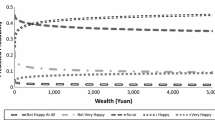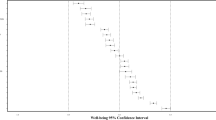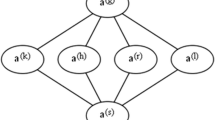Abstract
Researchers, policymakers, and the general public increasingly agree on the importance of subjective well-being as an indicator of individual and societal welfare. A vast literature has emerged over the last twenty years documenting the many variables that influence subjective well-being. The purpose of this study is to quantify the relative importance of these determinants in an attempt to synthesize the main strands in the literature and inform policy formulations. We use in our analysis three years’ worth of data from the Gallup World Poll, including 153 countries and ten geopolitical regions. We estimate the relative importance of four major domains of subjective well-being using a basic model with 25 independent variables, and a broader set of seven domains using an extended model with 60 independent variables. Our results show that material well-being is the main determinant of subjective well-being across all ten geopolitical regions. A particularly strong determinant of subjective well-being in our study is feelings about household income, whereas community functioning, governance and altruistic behaviors have a relatively low importance. Our results suggest that subjective material well-being and its objective determinants, including economic growth and income inequality, should remain at the center of the research and policy agenda. Further research is recommended to ascertain the relative importance of social, physical and purpose well-being.
Similar content being viewed by others
Notes
Including income, satisfaction with standard of living and ownership of luxury conveniences such as televisions, computers, and the Internet.
See http://www.gallup.com/178667/gallup-world-poll-work.aspx for further methodological details.
Life satisfaction measured using the following item: “All things considered, how satisfied are you with your life as a whole these days? Use a 0 to 10 scale, where 0 is dissatisfied and 10 is satisfied.”.
For further details, see Gallup Global Report: Where the Great Jobs are (2015). http://www.gallup.com/services/186200/gallup-global-report-great-jobs.aspx.
References
Akay, A. & Martinsson, P. (2009). Sundays are blue: aren’t they? The day-of-the-week effect on subjective well-being and socio-economic status. IZA Discussion Paper No. 4563.
Aknin, L. B., Barrington-Leigh, C. P., Dunn, E. W., Helliwell, J. F., Burns, J., Biswas-Diener, R., et al. (2013). Prosocial spending and well-being: Cross-cultural evidence for a psychological universal. Journal of Personality and Social Psychology, 104(4), 635–652.
Bartolini, S., Bilancini, E., & Pugno, M. (2013). Did the decline in social connections depress Americans’ happiness? Social Indicators Research, 110(3), 1033–1059.
Boarini, R. Comola, M., Smith, R., Manchin, R., & de Keulenaer, F. (2012). What makes for a better life? The determinants of subjective well-being in OECD countries—evidence from the Gallup World Poll. OECD Statistics Working Papers, 2012/03, OECD Publishing.
Busseri, M. A., & Sadava, S. W. (2011). A review of the tripartite structure of subjective well-being: Implications for conceptualization, operationalization, analysis, and synthesis. Personality and Social Psychology Review, 15, 290–314.
Canty, A., & Ripley, B. (2015). Bootstrap functions—Package ‘boot’. (Version 1.3–17) [Computer program].
Clark, A., Etilé, F., Postel-Vinay, F., Senik, C., & Van der Straeten, K. (2005). Heterogeneity in reported well-being: evidence from twelve European countries. The Economic Journal, 115(502), C118–C132.
Clark, A. E., Frijters, P., & Shields, M. A. (2008). Relative income, happiness, and utility: An explanation for the Easterlin paradox and other puzzles. Journal of Economic literature, 46(1), 95–144.
Clark, A. E., Layard, R., & Senik, C. (2012). The causes of happiness and misery. UN World Happiness Report, 59–89.
Deaton, A., & Tortora, R. (2015). People in Sub-Saharan Africa rate their health and health care among the lowest in the world. Health Affairs, 34(3), 519–527.
Diener, E. (1984). Subjective well-being. Psychological Bulletin, 95(3), 542–575.
Diener, E., Diener, M., & Diener, C. (1995). Factors predicting the subjective well-being of nations. Journal of Personality and Social Psychology, 69, 851–864.
Diener, E., Kahneman, D., Tov, W., & Arora, R. (2010). Income’s association with judgments of life versus feelings. In Ed Diener, Daniel Kahneman, & John Helliwell (Eds.), International differences in well-being. New York: Oxford University Press.
Dolan, P., & Kavetsos, G. (2016). Happy talk: Mode of administration effects on subjective well-being. Journal of Happiness Studies, 17(3), 1273–1291.
Dolan, P., Peasgood, T., & White, M. (2008). Do we really know what makes us happy? A review of the economic literature on the factors associated with subjective well-being. Journal of Economic Psychology, 29, 94–122.
Dolan, P., & White, M. P. (2007). How can measures of subjective well-being be used to inform public policy? Perspectives on Psychological Science, 2(1), 71–85.
Ferrer-i-Carbonell, A., & Frijters, P. (2004). How important is methodology for the estimates of the determinants of happiness? The Economic Journal, 114(497), 641–659.
Fleche, S., Smith, C., & Sorsa, P. (2011). Exploring determinants of subjective wellbeing in OECD countries: evidence from the world value survey. OECD Economics Department Working Papers, No. 921, OECD Publishing.
Frey, B. S., & Stutzer, A. (2000). Happiness, economy and institutions. The Economic Journal, 110(466), 918–938.
Fujiwara, D., & Campbell, R. (2011). Valuation techniques for social cost-benefit analysis: Stated preference, revealed preference and subjective well-being approaches, a discussion of the current issues. United Kingdom: HM Treasury and Department for Work and Pensions.
Gosling, S. D., Rentfrow, P. J., & Swann, W. B. (2003). A very brief measure of the Big-Five personality domains. Journal of Research in Personality, 37(6), 504–528.
Grömping, U. (2006). Relative importance for linear regression in R: the package relaimpo. Journal of Statistical Software, 17(1), 1–27.
Headey, B., & Wooden, M. (2004). The effects of wealth and income on subjective well-being and ill-being. Economic Record, 80(s1), S24–S33.
Helliwell, J. F. (2008). Life satisfaction and the quality of development. NBER Working Papers 14507, National Bureau of Economic Research.
Helliwell, J. F., Barrington-Leigh, C.P., Harris, A.,& Huang, H. (2009). International evidence on the social context of well-being. NBER Working Papers 14720, National Bureau of Economic Research.
Inglehart, R., & Welzel, C. (2005). Modernization, cultural change, and democracy: The human development sequence. Cambridge: Cambridge University Press.
Kahneman, D., & Krueger, A. B. (2006). Developments in the measurement of subjective well-being. Journal of Economic Perspectives, 20(1), 19–20.
Kitayama, S., & Markus, H. R. (2000). The pursuit of happiness and the realization of sympathy: Cultural patterns of self, social relations, and well-being. In E. Diener & E. M. Suh (Eds.), Culture and subjective well-being (pp. 113–161). Cambridge, Massachusetts: MIT Press.
Kitayama, S., Mesquita, B., & Karasawa, M. (2006). Cultural affordances and emotional experience: socially engaging and disengaging emotions in Japan and the United States. Journal of Personality and Social Psychology, 91(5), 890.
Kristoffersen, I. (2010). The metrics of subjective wellbeing: Cardinality, neutrality and additivity. Economic Record, 86(272), 98–123.
Kroll, C. (2011). Different things make different people happy: Examining social capital and subjective well-being by gender and parental status. Social Indicators Research, 104(1), 157–177.
Kroll, C., & Delhey, J. (2013). A happy nation? Opportunities and challenges of using subjective indicators in policymaking. Social Indicators Research, 114(1), 13–28.
Krueger, A. B., & Schkade, D. A. (2008). The reliability of subjective well-being measures. Journal of Public Economics, 92(8), 1833–1845.
Kuroki, M. (2013). Crime victimization and subjective well-being: evidence from happiness data. Journal of Happiness Studies, 14(3), 783–794.
Lindeman, R. H., Merenda, P. F., & Gold, R. Z. (1980). Introduction to bivariate and multivariate analysis. Glenview, IL: Scott, Foresman.
Linna, M. S., Kaprio, J., Raevuori, A., Sihvola, E., Keski-Rahkonen, A., & Rissanen, A. (2013). Body mass index and subjective well-being in young adults: a twin population study. BMC Public Health, 13(1), 1–9.
Lucas, R. E. (2007). Long-term disability is associated with lasting changes in subjective well-being: Evidence from two nationally representative longitudinal studies. Journal of Personality and Social Psychology, 92(4), 717–730.
Lucas, R. E., & Diener, E. (2008). Personality and subjective well-being. In O. P. John, R. Robins, & L. A. Pervin (Eds.), Handbook of personality: Theory and research (3rd ed., pp. 795–814). New York: Guilford.
Luhmann, M., Hofmann, W., Eid, M., & Lucas, R. E. (2012). Subjective well-being and adaptation to life events: a meta-analysis. Journal of Personality and Social Psychology, 102(3), 592–615.
Manning, V., Gomez, B., Guo, S., Low, Y., Koh, P., & Wong, K. (2012). An exploration of quality of life and its predictors in patients with addictive disorders: Gambling, alcohol and drugs. International Journal of Mental Health and Addiction, 10(4), 551–562.
Oguz, S., Merad, S., & Snape, D. (2013). Measuring national well-being—What matters most to personal well-being?. London: Office for National Statistics.
Oishi, S. (2010). Culture and well-being: Conceptual and methodological issues. In Ed Diener, Daniel Kahneman, & John Helliwell (Eds.), International differences in well-being. New York: Oxford University Press.
Oswald, A. J., & Wu, S. (2010). Objective confirmation of subjective measures of human well-being: Evidence from the USA. Science, 327(5965), 576–579.
Piliavin, J. A., & Siegel, E. (2007). Health benefits of volunteering in the Wisconsin longitudinal study. Journal of Health and Social Behavior, 48(4), 450–464.
Schwarz, N., & Strack, F. (1999). Reports of subjective well-being: Judgmental processes and their methodological implications. In D. Kahneman, E. Diener, & N. Schwarz (Eds.), Well-being: The foundations of hedonic psychology (pp. 61–84). New York: Russell Sage Foundation.
Senik, C. (2011). The French unhappiness puzzle: The cultural dimension of happiness. Paris School of Economics Working Paper, No. 2011–34, Paris-Jourdan Sciences Économiques.
Tov, W., & Au, E. W. M. (2013). Comparing well-being across nations: Conceptual and empirical issues. In I. Boniwell & S. David (Eds.), Oxford handbook of happiness (pp. 448–464). Oxford: Oxford University Press.
Tov, W., & Diener, E. (2013). Subjective well-being. In K. D. Keith (Ed.), Encyclopedia of cross-cultural psychology. New York: Wiley.
Van Praag, B. M., Frijters, P., & Ferrer-i-Carbonell, A. (2003). The anatomy of subjective well-being. Journal of Economic Behavior and Organization, 51(1), 29–49.
Veenhoven, R. (2010). How universal is happiness? In Ed Diener, Daniel Kahneman, & John Helliwell (Eds.), International differences in well-being. New York: Oxford University Press.
Way, B. M., & Lieberman, M. D. (2010). Is there a genetic contribution to cultural differences? Collectivism, individualism and genetic markers of social sensitivity. Social Cognitive and Affective Neuroscience, 5(2–3), 203–211.
Winkelmann, R. (2005). Subjective well-being and the family: Results from an ordered probit model with multiple random effects. Empirical Economics, 30(3), 749–761.
Acknowledgments
We would like to thank Gallup for providing access to the Gallup World Poll data. We are particularly grateful to our Gallup colleagues that provided logistic support and feedback on this manuscript, including Julie Ray, Rajesh Srinivasan, Andrew Rzepa, Jon Clifton, Stafford Nichols and Jihad Fakhreddine.
Author information
Authors and Affiliations
Corresponding author
Electronic Supplementary Material
Below is the link to the electronic supplementary material.
Rights and permissions
About this article
Cite this article
Diego-Rosell, P., Tortora, R. & Bird, J. International Determinants of Subjective Well-Being: Living in a Subjectively Material World. J Happiness Stud 19, 123–143 (2018). https://doi.org/10.1007/s10902-016-9812-3
Published:
Issue Date:
DOI: https://doi.org/10.1007/s10902-016-9812-3








